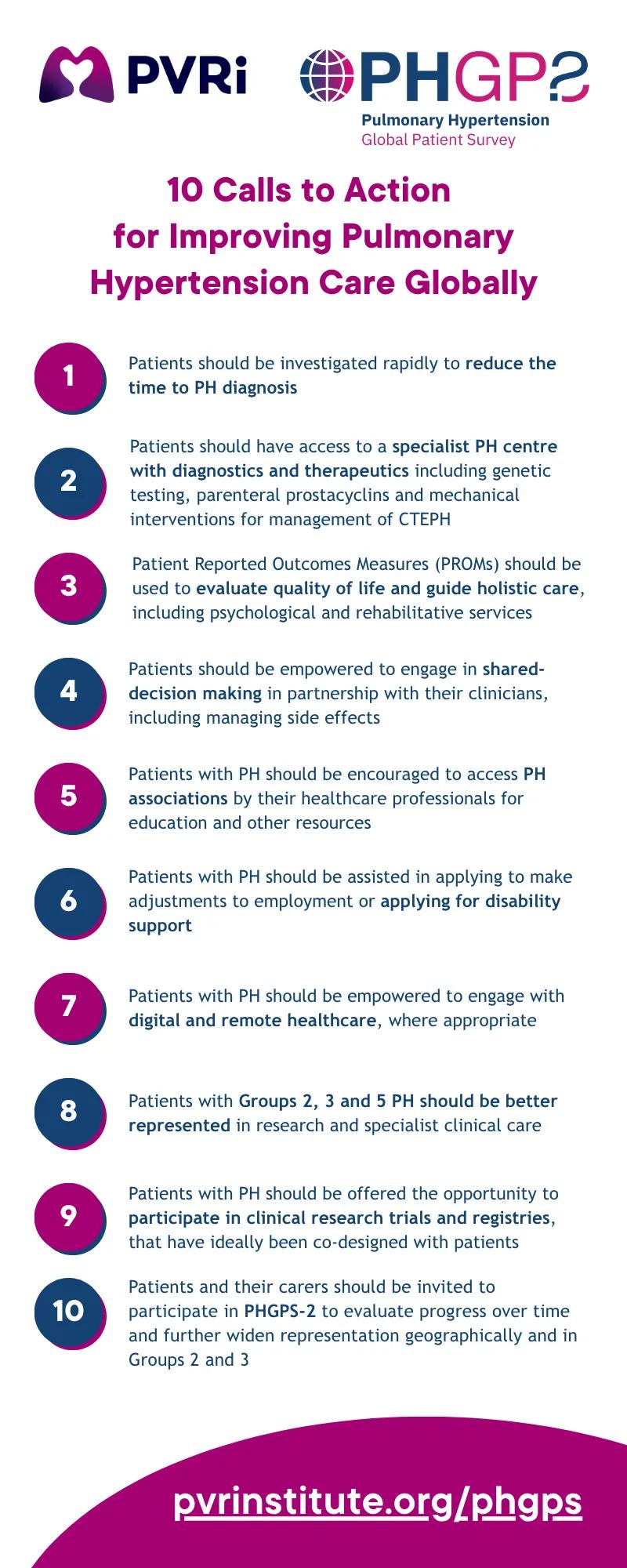
Breadcrumb
- Home
- Learning and Research
- Latest News
- First Descriptive Findings From The PHGPS Adult Co...
First descriptive findings from the PHGPS adult cohort published in ERJ Open Research
Our Pulmonary Hypertension Global Patient Survey (PHGPS), the largest survey to date to explore the perspectives of patients with PH at a global scale, has released initial findings from its adult cohort of 3,329 patients living with PH.
The ‘The Pulmonary Hypertension Global Patient Survey: understanding the experiences and perspectives of patients’ paper published in ERJ Open Research focuses on the findings from the adult cohort, across the themes of diagnostics, treatment, support, quality of life, digital health and clinical research participation.
The paper highlights that most PAH patients reported a diagnosis within 12 months of symptom onset. Variability was seen in survey response, PH management and research participation, favouring the Global North and PH Groups 1/4. 33.9% of eligible patients reported genetic testing. 58% were experienced in self-monitoring their health. 20.6% of patients with PH have completed PROMs, with 7% feeling they changed management. 19.1% of adult patients participated in research; however, 72.2% who have not participated would be willing if invited.
Read the full paper here
After a year-long analysis and interval findings presented and discussed at international conferences, including the European Respiratory Society (Milan 2023 & Vienna 2024), PVRI Congress (London 2024 & Rio 2025) and the World Symposium on PH (Barcelona 2024), the PHGPS has identified 10 key global priorities for improving care for adult patients with PH. These 10 calls to action aim to enhance equitable access to care and research opportunities, particularly across areas of geographical disparities:
- Patients should be investigated rapidly to reduce the time to PH diagnosis
- Patients should have access to a specialist PH centre with diagnostics and therapeutics including genetic testing, parenteral prostacyclins and mechanical interventions for management of CTEPH
- Patient Reported Outcomes Measures (PROMs) should be used to evaluate quality of life and guide holistic care, including psychological and rehabilitative services
- Patients should be empowered to engage in shared-decision making in partnership with their clinicians, including managing side effects
- Patients with PH should be encouraged to access PH associations by their healthcare professionals for education and other resources
- Patients with PH should be assisted in applying to make adjustments to employment or applying for disability support
- Patients with PH should be empowered to engage with digital and remote healthcare, where appropriate
- Patients with Groups 2, 3 and 5 PH should be better represented in research and specialist clinical care
- Patients with PH should be offered the opportunity to participate in clinical research trials and registries, that have ideally been co-designed with patients
- Patients and their carers should be invited to participate in PHGPS-2 to evaluate progress over time and further widen representation geographically and in Groups 2 and 3
The challenge to the global PH scientific and medical community is how to incorporate these into your local healthcare practice and identify areas for improvement. Get in touch with PVRI if you feel the PHGPS data can help you and you would like to discuss it with us.
A massive thank you again to all the patients and patient organisations who contributed to the success of the survey. And a big congratulations to Joseph Newman, Hakim Ghani, Shiv Munagala, Eva Otter, Gerald Fischer, Marcin Kurzyna, Gergely Meszaros, Millicent Stone, Lynsay MacDonald, Shahin Moledina, Luke Howard, Wendy Gin-Sing, Pisana Ferrari, Maurice Beghetti, Katherine Bunclark, Mark Toshner, Matt Granato, The PHGPS consortium, and Joanna Pepke-Zaba on your findings!
Plans are evolving for a follow-up PHGPS-2 to understand change over time, in addition to regional differences. Visit https://pvrinstitute.org/phgps to keep informed of the latest PHGPS developments.